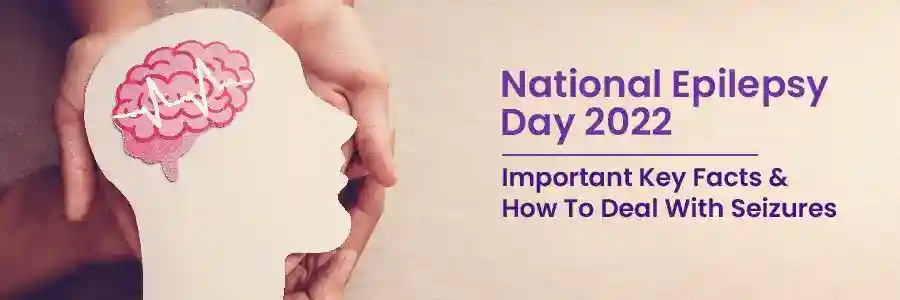- Cardiology 84
- Dermatology 45
- Endocrinology 33
- ENT 16
- Fertility 190
- Gastroenterology 78
- General-Medicine 81
- Gynecology 80
- Hematology 19
- Infectious-Diseases 33
- Neurology 52
- Oncology 34
- Ophthalmology 23
- Orthopedics 69
- Pediatrics 31
- Procedure 23
- Public-Health 144
- Pulmonology 59
- Radiology 8
- Urology 68
- Wellness 161
- Woman-and-child 77

National Epilepsy Day 2024
Epilepsy is a common neurological illness that affects people of all ages worldwide. It is characterised by recurrent seizures, which cause abnormal electrical activity in the brain. While epilepsy can be challenging, especially for those experiencing seizures, the condition can often be effectively managed with proper treatment and support.
What is Epilepsy?
Epilepsy is a persistent neurological condition. It causes a variety of seizures, from minor gaps in concentration to severe and persistent convulsions. Each person's experience with epilepsy is unique, and recognising the various types of seizures and their consequences is critical for providing proper care and support.
Secure your health with a second opinion. Make informed decisions and book your appointment today!
Get A Second OpinionFacts About Epilepsy
In India alone, approximately 10 million people live with epilepsy, experiencing seizures that can disrupt daily life. Despite its prevalence, epilepsy is still widely misunderstood, leading to stigma and misconceptions. Many individuals in developing countries lack access to proper diagnosis and treatment, highlighting the need for increased awareness and healthcare resources.
Why Do We Celebrate Epilepsy Day?
We celebrate Epilepsy Day to raise awareness about epilepsy, reduce the stigma surrounding the condition, educate communities about its impact, and advocate for better support and healthcare for individuals living with epilepsy. It's an opportunity to promote understanding, support research efforts, and improve the quality of life for those affected by epilepsy worldwide.
Challenges Faced by Individuals with Epilepsy
Living with epilepsy presents various challenges beyond the seizures themselves. Many people with epilepsy encounter discrimination and social stigma, which can impact their education, employment, and relationships. Access to affordable and effective treatment is often limited, particularly in underserved communities, further exacerbating the challenges faced by individuals with epilepsy.
Why Education Matters
Educating communities about epilepsy is important for dispelling myths and eradicating discrimination. By promoting awareness, we can encourage compassion and empathy for people living with epilepsy. Early diagnosis and treatment are crucial for properly controlling the condition and increasing the quality of life for individuals affected.
Ready to take control of your health journey? Book your appointment now and start your path towards wellness today!
Book an AppointmentTaking Action on National Epilepsy Day
On November 17th, National Epilepsy Day provides an opportunity to unite in support of individuals with epilepsy. It is a day to celebrate their strength and resilience while advocating for better healthcare services and support systems. By participating in awareness campaigns and sharing accurate information about epilepsy, we can create a more inclusive and supportive environment for everyone.
Conclusion
National Epilepsy Day 2024 is more than just a day of awareness; it is a call to action to better the lives of millions of people living with epilepsy worldwide. By encouraging understanding, offering support, and campaigning for better healthcare, we can make significant progress towards a world where epilepsy is better understood and those living with the condition can thrive.
Frequently Asked Questions
National Epilepsy Day is a day dedicated to raising awareness about epilepsy, a neurological disorder that causes seizures.
National Epilepsy Day is observed on November 17th each year in India to educate people about epilepsy and reduce stigma.
It aims to educate the public about epilepsy, support people with epilepsy, and promote understanding and acceptance.
No, epilepsy is not contagious. It is a neurological condition and cannot be spread from person to person like a cold or flu.
Yes, epilepsy can affect people of all ages, including children. Early diagnosis and treatment are crucial for managing seizures in children.

- Cardiology 2132
- Dermatology 168
- Endocrinology 135
- ENT 97
- Fertility 217
- Gastroenterology 232
- General 478
- General-Medicine 1685
- Gynecology 169
- Hematology 85
- Infectious-Diseases 208
- Neurology 207
- Oncology 345
- Ophthalmology 65
- Orthopedics 187
- Pediatrics 83
- Procedure 72
- Public-Health 209
- Pulmonology 126
- Radiology 13
- Second Opinion 311
- Urology 294
- Wellness 600
- Woman-and-child 447
- Others 10217
Related Blogs
If you have any questions, please fill out the enquiry form or call us, and we will get back to you promptly.
040-68334455